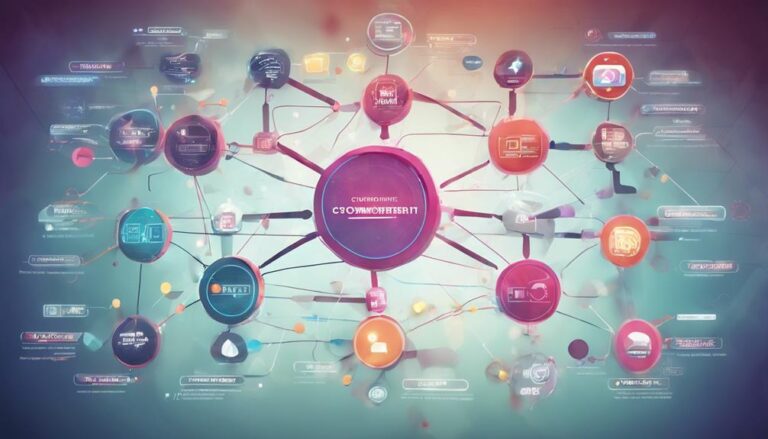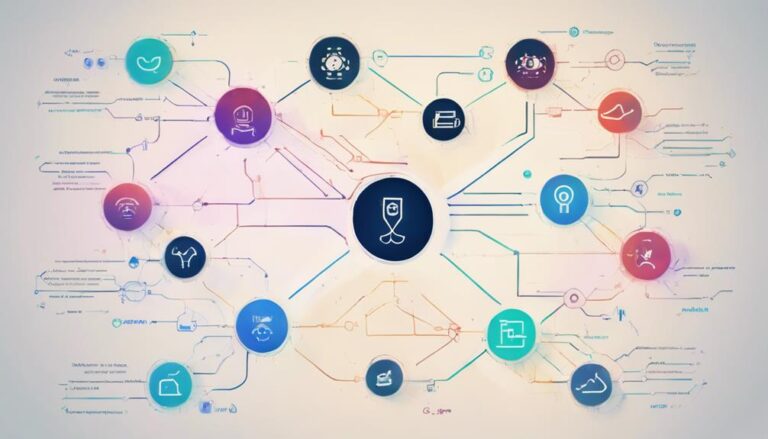AI-powered marketing strategies use advanced data analytics and machine learning to create personalized customer experiences and improve campaign effectiveness. I see companies leveraging predictive analytics tools to forecast behaviors and optimize marketing tactics. Chatbots and automation drive 24/7 customer service, increasing engagement. AI enhances targeting with precision by analyzing vast datasets, leading to higher ROI and customer satisfaction. Brands like Coca-Cola and Amazon already benefit from this approach, seeing significant sales boosts. If you're curious about how these advancements can revolutionize your marketing efforts, there's more to uncover.
Key Takeaways
- Utilize predictive analytics to forecast customer behaviors and optimize marketing strategies for better engagement and ROI.
- Implement chatbots to provide 24/7 personalized customer service and automate marketing communications.
- Leverage machine learning algorithms to analyze data and create highly targeted, personalized marketing campaigns.
- Use Natural Language Processing (NLP) to gain insights from customer interactions and tailor marketing efforts accordingly.
- Incorporate personalization algorithms to recommend relevant products and services, enhancing customer satisfaction and conversion rates.
Understanding AI Marketing
Understanding AI marketing means recognizing how artificial intelligence is revolutionizing our approach to data analysis and personalized customer experiences. By leveraging AI marketing tools, we can gain deep insights into customer behavior and tailor marketing strategies accordingly.
Advanced technologies like machine learning techniques enable us to analyze vast amounts of data, uncover patterns, and predict future trends. This allows for more accurate customer targeting and the creation of highly personalized experiences. Companies optimizing their campaigns with AI insights are seeing significant improvements in engagement and conversion rates.
In today's innovation-driven market, staying ahead means embracing AI-powered approaches to understand and meet customer needs more effectively. AI marketing isn't just a trend; it's the future of data-driven marketing strategies.
Types of AI Marketing
When I think about the most impactful types of AI marketing, predictive analytics tools and chatbots immediately come to mind. Predictive analytics enables us to forecast customer behavior, streamlining our campaign efforts for better outcomes.
Meanwhile, chatbots and automation provide 24/7 personalized customer support, enhancing user experiences and engagement.
Predictive Analytics Tools
Predictive analytics tools harness the power of data analysis and machine learning to forecast future customer behaviors and optimize marketing strategies, giving businesses a competitive edge.
By examining customer behavior patterns, these tools help us make informed decisions about trends, preferences, and potential risks.
Leveraging historical data and machine learning algorithms, predictive analytics tools enable highly personalized marketing efforts, improving targeting accuracy and enhancing campaign effectiveness.
As a result, we can't only boost ROI but also increase customer engagement.
Companies utilizing these tools gain a substantial competitive advantage by anticipating market shifts and refining their strategies accordingly.
Embracing predictive analytics tools is essential for staying ahead in today's fast-paced, data-driven marketing landscape.
Chatbots and Automation
As we harness predictive analytics to anticipate customer needs, chatbots and automation take our marketing strategies a step further by providing real-time, personalized interactions and streamlining repetitive tasks. By leveraging AI, we achieve:
- 24/7 customer service: Chatbots handle queries around the clock, enhancing user satisfaction.
- Personalized responses: AI delivers tailored interactions, making customers feel valued.
- Automated email campaigns: Automation saves time and guarantees timely, relevant communication.
- Efficient social media posting: Scheduled posts maintain consistent engagement.
Automated marketing strategies, driven by AI data analysis, boost our efficiency and customer engagement. By integrating chatbots and automation into our efforts, we can focus on crafting innovative campaigns while AI manages the repetitive, data-driven tasks.
Benefits of AI Strategies

Harnessing AI-powered marketing strategies greatly enhances campaign effectiveness and customer targeting by providing data-driven insights. With advanced analytics, I can explore deeply into customer behavior, allowing me to create personalized experiences that truly resonate.
Automation streamlines my processes, making it easier to optimize campaigns and achieve higher ROI. Predictive analysis helps me anticipate trends and adjust my strategies accordingly, leading to improved efficiency and significant cost savings.
By leveraging machine learning, I can refine customer targeting and deliver precisely tailored marketing experiences. Ultimately, AI strategies transform how I engage with customers, ensuring that every interaction is meaningful and impactful.
This innovative approach drives better engagement and fosters stronger customer relationships, positioning my brand ahead in the competitive market.
Implementing AI in Marketing
Implementing AI in marketing starts with pinpointing operational bottlenecks and seeking out automation solutions to streamline workflows and boost efficiency.
By leveraging AI in marketing, we can:
- Optimize marketing strategies with data-driven insights.
- Improve customer engagement through personalized advertising.
- Use Natural Language Processing (NLP) to analyze customer data.
- Implement Image Recognition for targeted campaigns.
Embracing tools for marketing automation is essential. These tools help us not only to enhance our marketing strategies but also to monitor AI solutions effectively.
The result? Streamlined marketing processes and a more refined approach to customer engagement.
Top AI Marketing Tools

When it comes to leveraging AI for marketing, tools like Salesforce Einstein and Adobe Sensei are game-changers with their predictive analytics and personalization algorithms.
HubSpot's AI Blog Topic Generator and Marketo's email marketing automation are also leading the charge.
Let's explore how these tools enhance customer engagement through predictive analytics, chatbots, and tailored experiences.
Predictive Analytics Tools
Leveraging predictive analytics tools like Salesforce Einstein and Marketo, marketers can analyze past data to forecast future trends and optimize strategies for better campaign performance. By employing machine learning algorithms, these tools don't just enhance campaign effectiveness but also personalize customer experiences and target audience segments with precision. Data-driven decisions become second nature, allowing us to stay ahead of the curve and seize new opportunities.
- Salesforce Einstein: Uses AI to predict customer behavior and optimize marketing efforts.
- Marketo: Offers robust analytics to segment audiences and personalize campaigns.
- Forecast Trends: Identifies emerging patterns to adapt strategies proactively.
- Optimize Strategies: Refines marketing approaches for higher engagement and ROI.
Incorporating these tools is key to crafting innovative, effective marketing strategies.
Chatbots for Engagement
Chatbots have revolutionized customer engagement by providing real-time interactions that boost satisfaction and conversion rates. These AI-powered tools handle customer queries, offer product recommendations, and even process transactions autonomously. Major retailers like Sephora and H&M have adopted chatbots to enhance their customer service, resulting in improved response times and higher customer satisfaction.
| Company | Benefits of Chatbots |
|---|---|
| Sephora | Enhanced customer service, increased conversion rates |
| H&M | Faster response times, improved customer satisfaction |
| General | Real-time interactions, autonomous transactions |
| Trends | Growing use in marketing, personalized interactions |
| Future | Continued innovation, higher efficiency |
Chatbots are not just a trend—they're essential for any business aiming to stay ahead. These tools offer personalized and efficient customer interactions, making them indispensable in modern marketing strategies.
Personalization Algorithms
AI-powered personalization algorithms are transforming marketing by analyzing customer behavior to deliver tailored experiences that boost engagement and conversion rates. By leveraging machine learning and predictive analytics, these algorithms can anticipate customer needs and preferences, enabling highly targeted marketing campaigns. Top AI marketing tools like Salesforce Einstein utilize personalization algorithms to enhance customer satisfaction and drive business growth.
Here's how personalization algorithms are making a difference:
- Analyze individual customer data to understand unique preferences.
- Recommend relevant products or services based on past behavior.
- Create dynamic, tailored experiences that resonate with customers.
- Boost conversion rates and customer satisfaction through precise targeting.
In today's competitive landscape, using AI-powered personalization algorithms is essential for delivering the innovative experiences customers crave.
Real-World AI Examples
In today's competitive market, companies like Coca-Cola, Amazon, and Spotify are harnessing AI to drive significant increases in sales and user engagement.
Coca-Cola's AI marketing strategy focuses on creating personalized experiences by analyzing customer behavior through AI algorithms. This has led to a 57% increase in sales by delivering personalized content and targeted marketing campaigns.
Amazon leverages customer data to offer personalized recommendations, boosting sales by 29%.
Spotify uses AI to provide personalized music recommendations, enhancing user engagement and retention.
Sephora and Nike also excel with AI, offering personalized beauty and shopping experiences that optimize marketing campaigns. Through customer segmentation, these brands effectively enhance customer satisfaction and conversion rates, demonstrating the power of AI in modern marketing.
Future of AI Marketing

The future of AI marketing looks incredibly promising, with projections indicating that AI technologies will contribute over $2.6 trillion in value by 2025, transforming how businesses engage with customers. Marketing organizations are rapidly adopting AI-powered marketing strategies to fuel digital commerce revenue growth and enhance customer engagement.
The use of advanced algorithms allows us to:
- Predict customer behavior with high accuracy
- Deliver highly personalized experiences
- Drive conversions more effectively
- Optimize marketing campaigns for better ROI
Frequently Asked Questions
How to Use AI for Marketing Strategies?
To use AI for marketing strategies, I'd leverage predictive analytics, content personalization, sentiment analysis, chatbot integration, customer segmentation, ad optimization, email automation, dynamic pricing, lead scoring, and voice search to drive innovation, efficiency, and engagement.
What Is Ai-Powered Marketing?
AI-powered marketing uses data analytics for customer segmentation, predictive modeling for personalized content, chatbot interactions for engagement, campaign automation for efficiency, sentiment analysis for insights, visual recognition for targeting, and dynamic pricing for competitiveness.
What Are Some Examples of AI in Marketing Today?
I see AI in marketing through chatbots automation, predictive analytics for customer segmentation, sentiment analysis for content generation, dynamic pricing, email personalization, social listening, visual recognition, and voice search. These innovations drive engagement, retention, and conversion.
How Do Brands Use AI in Marketing?
Brands use AI in marketing to enhance customer segmentation, leverage predictive analytics, enable content personalization, automate chatbots, implement dynamic pricing, conduct sentiment analysis, deploy recommendation engines, utilize image recognition, optimize voice search, and forecast trends.
Conclusion
Cracking the code of AI-powered marketing strategies felt like discovering a treasure chest of insights. The data tells the story: higher engagement, personalized experiences, and streamlined operations.
I've seen firsthand how these tools can transform marketing from a guessing game into a science. As we ride this technological wave, staying ahead of trends isn't just smart—it's essential.
So, let's harness the power of AI and chart a course for marketing success that's both innovative and effective.






